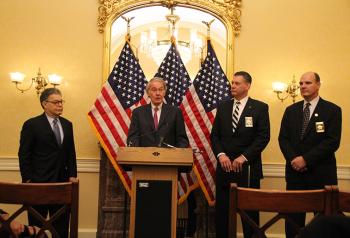In Washington for Winter Meeting, Sheriffs Support Senators’ Call to Maintain Pretrial Health Care Coverage

Washington, D.C. – The Major County Sheriffs’ Association (MCSA), National Sheriffs’ Association and the National Association of Counties (NACo) today joined members of the United States Senate in urging the Centers for Medicare and Medicaid Services (CMS) to revise federal guidance in an effort to allow for improved access to Medicaid for pretrial detainees.
As CMS prepares to release updated guidance on Medicaid coverage for inmates, Senators Al Franken (D–MN), Edward J. Markey (D–MA), Sherrod Brown (D–OH) and Richard J. Durbin (D–IL) sent a letter to CMS requesting the reexamination of Medicaid coverage for those who have been arrested, but not tried or convicted of a crime.
Currently, individuals who have been arrested and are able to post bail maintain Medicaid coverage, while those who remain in custody lose it despite not having been convicted of the crime for which they have been charged. The result leads to a gap in coverage for pretrial detainees who are in the greatest need of care, increased bureaucratic government red tape as individuals are shut off and then must reenroll and an unpredictable budgetary burden for Sheriffs Offices forced to pay the medical bills.
“If we are to stop the revolving door to the criminal justice system and reduce the rates of opioid overdoses in this country, we need a seismic shift in how we provide health care to this population,” said Sen. Markey. “Today, if you are arrested and cannot afford bail, you can be denied critical health services paid for by Medicaid, even though you have not been tried or convicted. That practice is discriminatory and must end. We need to ensure that states do not terminate Medicaid coverage for pre-trial individuals so they can continue to access critical health services such as substance abuse and mental health treatment.”
“Right now, many Medicaid recipients who are caught up in the justice system - these could be offenders with mental illnesses or substance abuse issues - aren’t able to access their health care coverage, and it’s costing our taxpayers and stressing local budgets,” said Sen. Franken. “That means cities, municipalities, and counties are being forced to cobble together funds to pick up the slack - and it also means gaps in treatments and care for individuals that don’t have private insurance. This is a real problem, and it’s one that needs to be addressed quickly, which is why I recently pressed the national Medicaid office to change its coverage policies for beneficiaries who have been arrested and are awaiting trials. I was pleased to be joined by Hennepin County Sheriff Rich Stanek on Capitol Hill today to highlight why this issue is important to Minnesota, and what can be done to fix it.”
“As the number of mental health and substance abuse cases rise, Sheriffs offices are increasingly becoming health care practitioners. Last year, 43 percent of those entering the Middlesex Jail required detoxification for drugs or alcohol, 45 percent reported a history of mental illness and our health services unit had more than 147,000 contacts with individuals in our custody,” said Middlesex (MA) Sheriff Peter J. Koutoujian, whose jail is cited in the letter. “We have a real window of opportunity at that moment to save lives. We provide medical care on the inside that must be continued when these people are released. Without health insurance, it's not going to happen.”
“On any given day, we house between 200 and 300 individuals at the Hennepin County Jail who suffer from mental illness,” said Hennepin County (MN) Sheriff Richard W. Stanek. “Current federal law cuts many of these individuals off from Medicaid funding the moment they are booked into our jail. This creates an unnecessary gap in health care coverage for those that are the most vulnerable and in-need of health-care-related services.”
“Pretrial inmates, regardless of their station in life, should not be denied essential Medicaid benefits by the federal government,” said Oakland County (MI) Sheriff Michael J. Bouchard, MCSA Vice President of Government Affairs. “At a heavy cost to local communities, often times those who are in need of health care services are not residents of the county where they are booked - they just happen to commit the crime there.”
“Counties are responsible for providing health care to approximately 11.4 million individuals who are booked into 91 percent of all local jails each year. Medicaid is crucial to fulfilling our obligations to these individuals, whom have a higher prevalence of chronic health conditions, serious mental illness and substance abuse disorders than the general population,” said National Association of Counties Health Steering Committee Chair, Mary Ann Borgeson, commissioner, Douglas County, Neb. “We urge CMS to increase flexibility in the Medicaid program to better enable counties to coordinate systems of care for these populations – improving health outcomes, reducing recidivism rates and ultimately providing savings to local taxpayers.”
###
The Major County Sheriffs’ Association (MCSA) is an association of elected sheriffs representing the nation’s largest counties with populations of 500,000 people or more, representing over 100 million Americans.
National Sheriffs’ Association (NSA) is the one of the largest association of law enforcement professionals in the United States, representing more than 3,000 elected sheriffs across the nation, and a total membership of more than 20,000. NSA is a non-profit organization dedicated to raising the level of professionalism among sheriffs, their deputies, and others in the field of criminal justice and public safety. Throughout its seventy-five year history, NSA has served as an information clearinghouse for sheriffs, deputies, chiefs of police, other law enforcement professionals, state governments and the federal government.
The National Association of Counties (NACo) unites America’s 3,069 county governments. Founded in 1935, NACo brings county officials together to advocate with a collective voice on national policy, exchange ideas and build new leadership skills, pursue transformational county solutions, enrich the public’s understanding of county government and exercise exemplary leadership in public service. More information at: www.naco.org.

